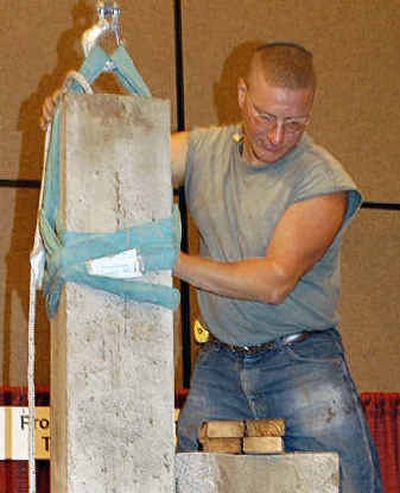Al-Zarqawi suspected in beheading

WASHINGTON — Terrorist Abu Musab al-Zarqawi was the masked man who beheaded an American civilian in Iraq, U.S. intelligence officials concluded Thursday, as other questions lingered about Nicholas Berg’s final days and his contacts with U.S. and Iraqi authorities.
An American diplomatic official in Iraq had told Berg’s family in early April that he was being detained by the U.S. military, according to e-mails provided by the family.
U.S. officials have said Berg, who was found dead last weekend in Baghdad, was detained by Iraqi police March 24 and was never in the custody of American forces.
Meanwhile, through a technical analysis, intelligence officials were able to determine “with high probability” that the speaker on a video showing Berg’s beheading was al-Zarqawi, a CIA official said, speaking on condition of anonymity. The same person is shown decapitating Berg, the official said.
U.S. authorities consider al-Zarqawi an ally of Osama bin Laden and say he is running his own terrorist operation.
The body of Berg, a self-employed telecommunications businessman, was found in western Baghdad. Three days later, an Islamic Web site released a video of his death, titled “Sheikh Abu Musab al-Zarqawi slaughters an American infidel with his own hands.”
In the video, five armed men disguised by head scarves and masks line up behind Berg, who is seated on the ground. Standing in the middle, the man identified as al-Zarqawi reads a lengthy statement that criticizes Islamic scholars and the “shameful photos” of the humiliation of men and women at the Abu Ghraib prison. He then decapitates Berg.
It is unclear when and how Berg was captured. Accounts of his detention in Mosul in late March are also conflicting.
U.S. officials insist he was arrested by Iraqi police for involvement in “suspicious activities.” The Mosul police chief has denied that. An April 1 e-mail from a U.S. consular official in Iraq, provided by Berg’s family, said he was being detained by the U.S. military.
The FBI visited Berg three times before he was released April 6, according to a senior FBI official. The agents told him Iraq was too dangerous for unprotected American civilians.
Berg wrote to his parents after his release that federal agents had questioned him about whether he had ever built a pipe bomb or had been in Iran.
Berg’s family members have called on the government to tell all it knows about its contacts with the 26-year-old and have blamed U.S. authorities for detaining him in Iraq until the anti-American violence worsened.
Berg had caught the FBI’s attention before.
Speaking to reporters outside his West Chester, Pa., home Thursday, Berg’s father, Michael, said his son was investigated by the FBI more than a year ago over contact he had with a terrorism suspect while he was a student at the University of Oklahoma.
Berg’s father said his son was dragged into that investigation because he allowed an acquaintance he rode the bus with to use his computer.
In what may be Berg’s last contact before his kidnapping, he checked out of Baghdad’s shabby Fanar Hotel on April 10 around 7 a.m., according to the receptionist. American businessman Andrew Robert Duke and the staff there said he left some of his belongings in storage, with plans to return.
“Inshallah (God willing), I will be back in a few days,” the receptionist said Berg told her.
A porter watched him walk down the street with his bags.
Berg’s killing was reminiscent of the 2002 death of Wall Street Journal reporter Daniel Pearl, who also was decapitated while a video camera captured the slaying.
Pearl’s killing is alleged to have been done by Khalid Shaikh Mohammed, a senior al Qaeda operative and accused mastermind of the Sept. 11 attacks.
The FBI is leading the investigation into Berg’s death. Meanwhile, the intelligence community is continuing to analyze the videotape, which is of relatively low quality.
Al-Zarqawi appears to be seeking an increasingly high-profile presence. As late as March, U.S. officials said he was not known for making public statements or taking credit for attacks. But in the past five weeks, he has released three recordings, including the beheading.
The military upped the reward for his killing or capture to $10 million in January.